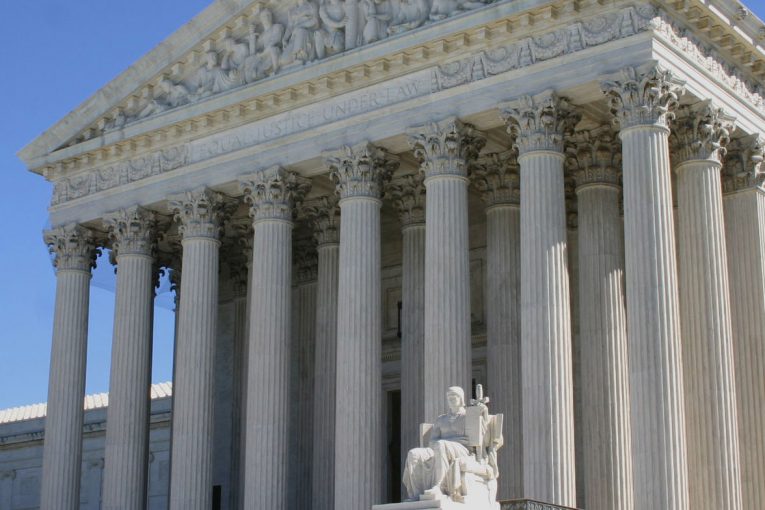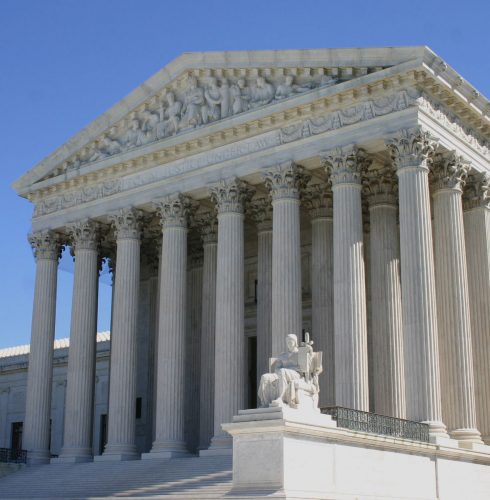

https://commons.wikimedia.org/wiki/File:US_Supreme_Court_DC.jpg
By Cindy Chen
WASHINGTON, DC — The Supreme Court’s highly contested ruling in Trump v. United States has sparked widespread debate and criticism on the subject of “presidential immunity” —contradicting the principle that no one, including the President, is above the law, according to a recently published article by Justia’s Verdict.
Former President Donald Trump’s legal challenges during his presidency, as outlined by Austin Sarat, initially revolved around allegations of obstructing justice and violating campaign finance laws.
Specifically, Sarat writes, Trump was accused of impeding investigations into Russian interference in the 2016 election and orchestrating “hush money” payments to silence claims of extramarital affairs.
His defense, as detailed by Sarat, centered on the doctrine of presidential immunity, arguing that the responsibilities inherent to the presidency shielded him from legal repercussions while in office. Trump contended that his actions fell within the scope of presidential duties and thus were insulated from prosecution.
Initially, the U.S. District Court for the District of Columbia and the Circuit Court of Appeals both ruled against Trump’s immunity claims.
During his confirmation hearings, Justice Brett Kavanaugh described presidential immunity as an almost unthinkable concept, noting, “No one has ever said…that the president is immune from civil or criminal process. So immunity is the wrong term to even think about in this process,” Kavanaugh testified, emphasizing the foundational principle of the Constitution: equal justice under law.
Similarly, wrote Sarat, Chief Justice John Roberts, in his 2005 confirmation hearings, asserted, “I believe that no one is above the law under our system, and that includes the president. The president is fully bound by the law, the Constitution, and statutes.”
But these views, which Sarat claims “once seemed self-evident,” faced scrutiny when former President Donald Trump brought the case to the Supreme Court. In a 5-4 decision, the Supreme Court sided with Trump’s assertion of immunity, ruling that a sitting President cannot face criminal prosecution while in office.
Justice Samuel Alito authored the majority opinion, arguing that subjecting the President to criminal proceedings could impair the execution of presidential duties and open the door to politically motivated legal actions.
Sarat further explains that the ruling comes as a contradiction to the U.S. District Court for the District of Columbia and the Circuit Court of Appeals, which both reaffirmed Kavanaugh’s and Roberts’s positions.
The circuit court’s opinion stated, “The structure of the Constitution mandates that the President is ‘amenable to the laws for his conduct’ and ‘cannot at his discretion’ violate them.”
Sarat highlights historical evidence suggesting that former Presidents, including Trump, did not consider themselves wholly immune from criminal liability for official acts during their presidency.
Moreover, as outlined by Austin Sarat, the lower courts reasoned that the potential for federal criminal liability could deter abuses of power and unlawful behavior. Granting presidential immunity, they concluded, would undermine the separation of powers by placing the President beyond the oversight of all three branches of government.
Ultimately, the Supreme Court decision has been criticized by Sarat as a move toward authoritarianism protected by judicial decree.
Justice Sonia Sotomayor, in her dissent, stated that the ruling makes “a mockery of the principle, foundational to our Constitution and system of Government, that no man is above the law.”